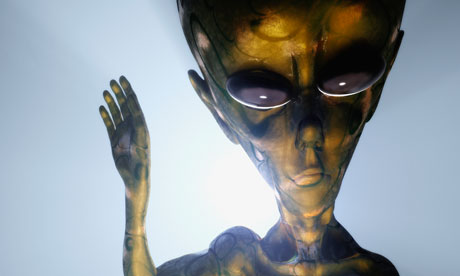
A group of six major British science fiction authors including Alastair Reynolds, Ken MacLeod and Geoff Ryman are calling urgently for closer collaboration between the arts and the sciences.
In a letter today to the Manchester Review, also signed by the authors Justina Robson, Simon Ings and Paul McAuley, they say Britain is "falling behind the United States", where the National Academy of Sciences' Science and Entertainment Exchange was set up in 2009 matching scientists with creative projects needing advice.
"In Britain, scientists and people in arts, TV, movie and literary worlds do not work together as they should. This is a major problem: we all desperately need to understand each other's constraints to create works that are entertaining, enlightening and scientifically authentic," they write. "As British science fiction writers, we are continually forced to balance scientific practice, current knowledge and future developments with the demands of fine storytelling. Getting that balance right is hard, but worthwhile, because credibility is so important both to audiences and the scientific community."
The authors are taking part in a symposium at the University of Manchester this week, where scientists and artists will gather to discuss how to guarantee the scientific credibility of fiction, as well as to hammer out the first steps in establishing a UK body similar to America's Science and Entertainment Exchange. "More support will be needed to make this dream a reality, so we call on scientists and the creative community to back us. A new body dedicated to this task must surely benefit the millions of people around the world who value and enjoy British fiction, film, television and the other arts," the authors say.
"I work with a lot of scientists and one of the frustrating things they find is that all this fascinating stuff is being done which doesn't find its way into science fiction. They say look at the science fact pages – they're so much more imaginative than science fiction," said Ryman, winner for his novels of a British Science Fiction Association award, a World Fantasy award and an Arthur C Clarke award, and a creative writing lecturer at the University of Manchester. "It's my experience that scientists can find it difficult to understand the needs of scriptwriters or storytellers. There is a way of working that ensures that scientific authenticity can be maintained [and] a gripping story gets told. There is a kind of process that can be followed. But both sides need to be aware of it."
Ryman pointed to help he received on one of his own stories from Dr Manolis Pantos of the Daresbury laboratory. "He was using new techniques to date cultural artefacts. In my story, small patterned cylinders had been found on Mars, and particle bombardment was helping to date them. How, on Mars, could we produce such particles? Oh, offered Dr Pantos, they will probably have portable synchrotrons by then. Portable synchronised particle accelerators on Mars? My mind at least boggled," he wrote in an article for the Manchester Review.
The author is working with his Manchester colleague Dr David Kirby, senior lecturer in science communication studies, on the collaboration project. "The key is to help these communities understand how best to work together," said Kirby. "Our workshop will be attended by major figures in the creative and scientific communities and is a first step to creating a body in the UK which brings together both sides."

